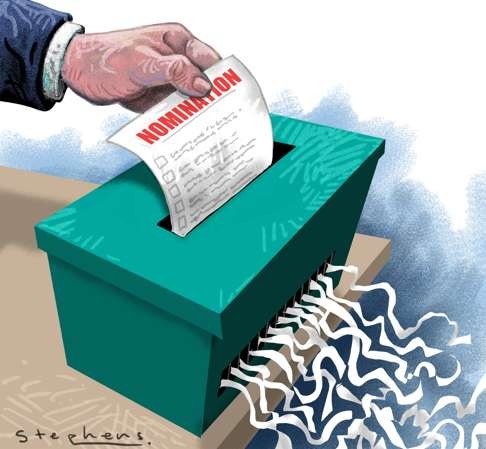
A blow to Hong Kong’s clean and fair electoral process – dealt by its own election officials
Cliff Buddle says the government’s apparent attempt to bar pro-independence candidates from standing in the Legco election is not only clumsy but may well be unlawful
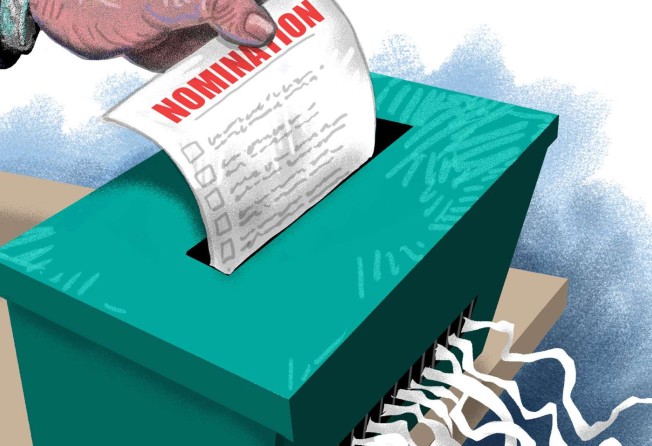

The polls have become much more democratic over the years, despite the continued presence of small-circle functional constituencies. Most important of all, they are generally regarded as being clean and lawful, returning candidates from across the political spectrum.
But the integrity of next month’s election could now be undermined by the government’s clumsy intervention in the nominating process, in an apparent bid to exclude pro-independence candidates.
Prospective candidates were, for the first time, asked to sign an additional form when tendering their nomination.
The Legislative Council Ordinance already requires them to declare they will uphold the Basic Law and pledge allegiance to the Hong Kong Special Administrative Region. That should be sufficient.
The new “confirmation form” introduced by the Electoral Affairs Commission is a curious document. It asks candidates to confirm their understanding that the promise to uphold the Basic Law includes three articles providing that Hong Kong is part of China. Candidates are put on notice that if they make a statement which is false, they commit a crime.
The form does not appear to have any legal basis or to add anything which is not already covered by the pledge to uphold the Basic Law.
Why highlight those particular provisions? The commission might have chosen to draw other parts of the Basic Law to the attention of candidates, such as Article 2, giving Hong Kong a high degree of autonomy; Article 27, protecting free speech; Article 32 on freedom of conscience; or Article 26 on the right to stand for election. Its subsequent rejection of certain candidates might well breach some of these provisions.
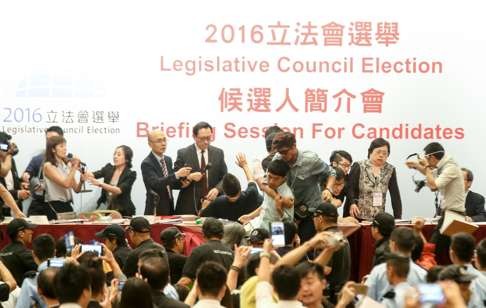
The hurried introduction of this new form, revealed only two days before the nomination period began, was clearly aimed at candidates who have pro-independence leanings.
The form does not appear to have any legal basis or to add anything which is not already covered by the pledge to uphold the Basic Law
But its significance is unclear. Signing it seemed to be a new requirement. Secretary for Constitutional and Mainland Affairs Raymond Tam Chi-yuen, however, said it was merely a factor in deciding whether a candidate would be approved. Commission chairman Mr Justice Barnabas Fung Wah, described it as an “administrative convenience measure” to help returning officers perform their duties.
If matters had rested there, it might not have caused a problem. But the way in which nominations were subsequently handled has raised further questions and concerns.
Six pro-independence candidates had their nominations rejected. One made it easy for the returning officer by stating a clear rejection of the Basic Law. But others appear to have complied with all the legal requirements.
The case of Edward Leung Tin-kei, a member of Hong Kong Indigenous, is of particular interest. Leung, generally regarded as a supporter of independence, was allowed to stand in a by-election in February in which he secured 66,000 votes. He was tipped to win a seat next month.
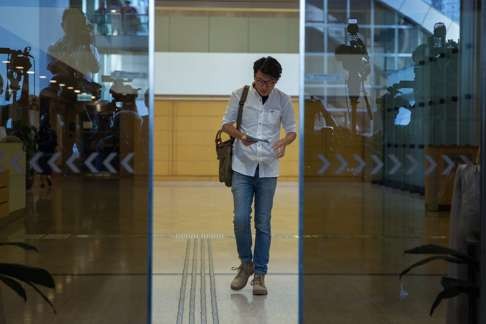
Asked by a returning officer whether he still supported independence, he dramatically changed his stance, responding with a “resounding no”. He even signed the new form. This was still not good enough for the returning officer, who invalidated his nomination anyway, saying she did not believe he had genuinely changed his position on independence. Her reply was backed up with media reports on Leung’s previous comments on independence, Facebook posts, and a transcript of remarks Leung had made at a press conference after signing the form.
Clearly, the role of returning officers has changed. They have become investigator, judge and jury
Clearly, the role of returning officers has changed. They have become investigator, judge and jury, rather than simply administering the nomination process.
The law does not appear to contemplate such a role for them. Returning officers are required to check that all the formalities have been complied with. This includes ensuring that the nomination form has been signed, along with the declaration to uphold the Basic Law, and the deposit paid.
If it later emerges that a declaration is false, there are potential legal consequences. But this is not a decision which returning officers, relying on newspaper reports and social media posts, are empowered or equipped to make.
The new role has placed a great burden on the shoulders of these civil servants. Some have even faced threats – a disturbing development.
Whatever we may think of Leung’s dramatic last-minute change in stance, it is difficult to see how a returning officer can be sure it is not genuine. What if a candidate regards independence as an option for Hong Kong, rather than advocating a split? What if he views it as something only to be considered after 2047, when fundamental changes are possible to the Basic Law? Does this amount to a failure to uphold the constitution in 2016?
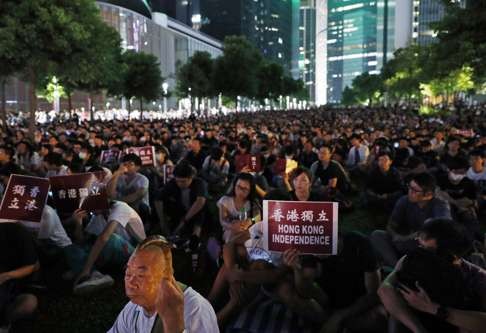
The inconsistent manner in which the nominations have been handled has made the whole approach appear arbitrary. Many pro-democracy candidates refused to sign the confirmation form, but their nominations were nonetheless validated. Some candidates with pro-independence leanings have been permitted to stand after stating that they would not advocate independence as a Legco candidate, but would support it in a personal capacity. It is difficult to understand the basis upon which these decisions are being made.
Legal challenges have already been presented to the courts, but were deemed to be premature. We can expect others to follow. The ability to stand in an election is a fundamental human right. If it is to be denied, there must be a legal basis for doing so and the process must be fair. The hasty, inconsistent and apparently arbitrary rejection of some candidates with little or no legal justification is ripe for challenge by judicial review.
Hong Kong’s future is as part of China under the “one country, two systems” concept. Supporters of independence are very much in a minority but the government, through its actions, is ensuring that their numbers grow.
Meanwhile, the ill-conceived intervention in the nominating process has tarnished elections which should be a beacon of democracy in Hong Kong.
Cliff Buddle is the Post’s editor, special projects